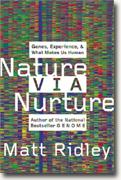Nature Via Nurture
Matt Ridley
book reviews:
· general fiction
· chick lit/romance
· sci-fi/fantasy
· graphic novels
· nonfiction
· audio books
· author interviews
· children's books @
curledupkids.com
· DVD reviews @
curledupdvd.com
newsletter
win books
buy online
links
home
for authors
& publishers
for reviewers

 |
Nature Via Nurture: Genes, Experience, and What Makes Us Human Matt Ridley HarperCollins Hardcover 336 pages April 2003 |
|
I have a history of driving my friends and family nuts with my incessant, never changing question, “Why?” A long line of elementary school teachers and preachers moaned in frustration at my refusal to take them at their word. If the plural for mouse is mice, then why isn’t the plural for house, hice? If the Garden of Eden was in Africa, then why aren’t Adam and Eve black in my Bible pictures? It must be genetic because I have passed the "why" word down to my children -- or did I simply teach it to them? Matt Ridley would say I did both.
Right off the bat, Ridley got my attention by claiming that the size of ape testicles is related to the food they eat. Why? Well, gorillas are herbivores -- they eat stems and leaves. There’s a lot of greenery about, but it’s not very nutritious and a gorilla has to spend a lot of time eating to get enough to thrive. This means that they stay in one place most of the day, forming naturally stable groups that are easy to defend. Males have therefore evolved a polygamous lifestyle where they keep a harem of females. They protect their own genetic destiny by driving away other males. To do this, they grow enormous bodies. On the other hand, chimpanzees are mainly frugivores. This means that they need a large range to be sure of finding a fruiting tree. When they do find one, there’s generally sufficient food for a lot of animals. However, a large range requires a more cooperative lifestyle. One male doesn’t monopolize the females because he may need his buddies to defend the range and search for food. Therefore, male chimpanzees band together and share the sexual favors of the females. There’s no need to grow a huge body to defend against other males. That means that genetic competition takes place inside the body of the females after mating. To be successful, the male chimp must have a potent ejaculate with sperm that can beat the sperm from other males to the egg. Therefore, as a percentage of body weight, chimpanzees have larger testicles than gorillas. Now THERE’S a fact to take to the game shows! Next, Ridley wowed me with his use of literary analogy to explain the difference between the genetic makeup of chimpanzees and humans. David Copperfield and The Catcher in the Rye use the same twenty-six letters in a variety of combinations called "words". Dickens uses a few words that Salinger doesn’t -- such as caul and pettish. Salinger uses a few that Dickins doesn’t -- such as crap and elevator. However, ninety percent of the words in one tome appear in the other, “Yet they are very different books. The difference lies not in the use of a different set of words but in the same set of words used in a different pattern and order. Likewise, the source of the difference between a chimpanzee and a human being lies not in the different genes but in the same set of 30,000 genes used in a different order and pattern.”Page after page of interesting scientific oddities that demonstrate the relationship between nature and nurture kept me fascinated for days. Things like:
© 2003 by Joyce Faulkner for Curled Up With a Good Book |
| Other books written or edited by Matt Ridley: |
|
|
|
 Click here to learn more about this month's sponsor! |
|
| fiction · sf/f · comic books · nonfiction · audio newsletter · free book contest · buy books online review index · links · · authors & publishers reviewers |
|
| site by ELBO Computing Resources, Inc. | |
 I picked up Nature Via Nurture because I was mildly interested in the state of research into the human genome. From the overleaf, one learns the premise of the book: nurture depends on genes and genes need nurture. Okay. Yawn! I expected a dull recitation of the facts and an extended argument as to why everyone else was wrong. (These scientific types get as vicious as a politician when you challenge their pet theories.) What I got was a delightfully readable book with a solid array of possibilities -- enough to keep me scratching my head and pondering for months.
I picked up Nature Via Nurture because I was mildly interested in the state of research into the human genome. From the overleaf, one learns the premise of the book: nurture depends on genes and genes need nurture. Okay. Yawn! I expected a dull recitation of the facts and an extended argument as to why everyone else was wrong. (These scientific types get as vicious as a politician when you challenge their pet theories.) What I got was a delightfully readable book with a solid array of possibilities -- enough to keep me scratching my head and pondering for months.